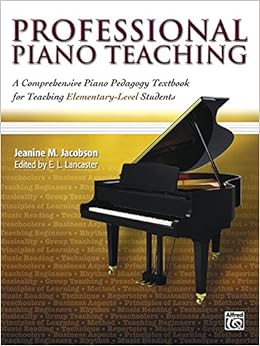Perhaps most valuable for the new teacher (or those of us returning to the private student after a long sabbatical) are the chapters that conclude the book: "The Business of Piano Teaching" and "Evaluation of Teaching." Over the years, I have found that the source of frustration for many teachers comes from not having clearly established policies that they feel comfortable implementing. Whether the issue relates to tuition, scheduling of lessons, or maintaining records, Jacobson offers sage advice in a way that makes the necessary task much more manageable. Additionally, Professional Piano Teaching reminds us of the importance of regular evaluation of our teaching as we pursue greater levels of excellence -- for the benefit of our students and the profession as a whole.
In conclusion, I wanted to share with you a few of the "nuggets" I found in Professional Piano Teaching. These words of wisdom have already impacted my personal teaching and I anticipate returning to the text repeatedly in the coming years.
- "While isolated mistakes are common to all pianists, learned mistakes result when students do not understand or forget the necessary information. Once a student kinesthetically learns a piece incorrectly, it is very difficult for him/her to unlearn it. To eliminate frustration for both the teacher and the student, it is sometimes best to drop the piece and study the same concepts and skills in another piece." (p. 105)
- "Pedaling is a listening skill, not a physical one, but a physical motion is needed to create the correct musical sound." (p. 170)
- "Just as university professors organize lectures, ministers outline sermons, and public school teachers prepare plans that organize the day's activities, piano teachers should plan what to teach in each lesson and how it will be taught. . . A lesson plan brings focus to the lesson and assures learning, progress and accomplishment. Teachers should not be afraid to alter the lesson plan when the student has practiced more or less than expected or has trouble with the assignment. The lesson plan provides structure so the teacher can confidently provide a valuable learning experience, regardless of the variables." (p. 206-207)
